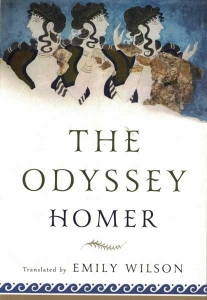
I read The Odyssey my sophomore year of high school, and the beautifully antiquated English and repetitive, ornamented epithets of the “wine-dark” sea and “rosy-fingered” dawn were not enough to entice me towards forming a personal connection with the text. Instead, I viewed the androcentric narrative of a man’s journey home after plunder and conquest as yet another ‘universal’ story that excluded, essentialized, and violated women. Call me naive, indeed I was; yet, it should come as no surprise to those well-versed or even peripherally familiar with classical studies that the boys’ club mentality of the discipline has a fraught history with welcoming female scholars to its elite ranks. In 2018, Emily Wilson became the first woman to publish an English translation of The Odyssey. Wilson’s introduction moves nimbly between the ancient world and the modern one. She presents a convincing argument for rendering an ancient text using frank, modern English. In effect, Wilson has authored a translation student readers will find accessible, casual readers enjoyable, and hopefully academic readers ideal for teaching and worthy of scholarly acclaim.
In her introduction to the translation, Wilson begins by defining an epic poem. According to Wilson, The Odyssey is an epic “in the sense that it is long, and in the sense that it presents itself as telling an important story.” On the one hand, The Odyssey’s elevated style, the regular poetic rhythm of dactylic hexameter (in Wilson’s translation iambic pentameter) and use of an assortment of formalistic language unassociated with the common dialects of ancient Greek peoples during any single time period, place the text in an elevated realm. On the other hand, Wilson notes how Odysseus’ story deviates from what modern readers may expect of an epic narrative in that there is no individual moment of climactic victory. Unlike “Jason claiming the Golden Fleece, Lancelot glimpsing the Holy Grail,” or modern examples such as Harry defeating Voldemort: “In The Odyssey, we find instead the story of a man whose grand adventure is simply to go back to his own home … For this hero, mere survival is the most amazing feat of all.” A central tenet of Wilson’s introduction is that Odysseus’ story is fundamentally tied to its roots in antiquity; yet, The Odyssey’s themes—of migration, ambiguous morality, homelessness and hospitality, fidelity and infidelity, deity worship, and the aftermath of violence and war—continue to carry profound relevance in the canon of Western literature, as in our contemporary world.
Wilson summarizes the contentious debate over the date of The Odyssey’s conception and the text’s authorship. The closest scholars have come to establishing consensus on the composition date of The Odyssey is sometime between the late seventh and late eighth centuries BCE. Long before the poem was transcribed, diverse versions and sections from the work were performed by bards as a form of entertainment for the elite families of ancient Greece. The poem’s origins in the oral tradition establish an additional level of complexity regarding the composition date and authorship of The Odyssey. Even if there existed a single author and scribe with an independent vision, the story of Odysseus predates The Odyssey as a written text.
The debate centering around The Odyssey’s authorship has therefore been similarly argumentative. In the nineteenth century, for example, Homeric scholarship was divided between the Unitarian and Analytic schools. The Unitarians believed that the poem was “not an aggregate of earlier, shorter compositions, but … composed by a lone author with a single overarching structure in mind.” Whereas, “[t]he Analysts, by contrast, argued that the epics [The Odyssey and The Iliad] were produced by many different hands.” Although it may be tempting to imagine Homer, “the poet,” as a single individual—most likely a man—Wilson invites readers to “question the notion that a unified structure and coherent creative product must necessarily be seen as the result of an individual’s work.” Modern readers familiar with the various forms of storytelling born as a result of advancements in technology may be more adept at viewing Homer’s text “as a mostly unified whole … which was created by multiple different people, over a long period of time.”
Migration, plunder, conquest, nationality, colonialism, and physical and racial Othering, are all recurring themes of The Odyssey. Wilson walks a careful line between using modern theoretical work in her introduction, while not utilizing terminology that evokes anachronistic interpretation in her translation. For example, while many modern translators have used the word “savage” to describe the cyclops, Wilson avoids the application of terms that carry connotations associated with British colonial history. Such terminology may cause readers to incorrectly map European colonialist practices on to those of ancient Greek peoples. In contrast to modern fears regarding migration, hospitality—albeit among elite, adult men—is a core motif of The Odyssey. Hospitality and the fair, honest treatment of strangers, or “guest-friends,” signifies for Odysseus whether or not an individual or a community is civilized. Wilson writes, “The word … xenos can mean both ‘stranger’ and ‘friend’; it is the root from which we get the English word ‘xenophobia’, the fear of strangers or foreigners, as well as the sadly less common ‘xenophilia’, the love of strangers or of unknown objects.”
The roles of women and the navigation of gender dynamics in The Odyssey are likewise rigorously addressed in Wilson’s introduction and translator’s note. Wilson discusses the text’s strong emphasis on female sexual fidelity. Although Odysseus has multiple affairs during his absence, the narrative rewards Penelope for remaining sexually chaste. Penelope’s fidelity to her husband, her role as the loyal partner, is paralleled with Agamemnon’s wife’s betrayal which results in the war hero’s tragic death. In regard to translation, Wilson does not use language that eroticizes the murdered slave women’s bodies at the text’s obscene conclusion: “in the scene where Telemachus oversees the hanging of the slaves who have been sleeping with the suitors, most translations introduce derogatory language (‘sluts’ or ‘whores’), suggesting that these women are being punished for a genuinely objectionable pattern of behavior, as if their sexual history actually justified their deaths. The original Greek does not label these slaves with any derogatory language.” Furthermore, Wilson refrains from presenting female beauty as a catalyst of male conflict, as in Christopher Marlowe’s famous words on Helen’s face: “the face that launched a thousand ships.” Directly translated, Helen’s face is described as “dog-like” and Wilson employs the verb “hounded” to describe the role of Helen’s objectified body during the Trojan War. Wilson emphasizes the patriarchal imaginary of The Odyssey, rather than attributing male actions to an essentialized aspect of women’s sexuality.
Wilson’s contemporary English translation flows effortlessly. Unlike many modern translators, Wilson engages poetic structure. She uses (unrhymed) iambic pentameter (five metrical feet, unstressed/stressed) the most common meter in regular English verse found in Chaucer, Shakespeare, and Milton. Moreover, Wilson states, “Homer’s language is markedly rhythmical, but it is not difficult or ostentatious … My translation is, I hope, recognizable as an epic poem, but it is one that avoids trumpeting its own status with bright, noisy linguistic fireworks, in order to invite a more thoughtful consideration of what the narrative means, and the ways it matters.” Linguistic flourishes may have a pseudo-scholarly effect; but in reality, our grandparents’ English, or the English of their parents, is no closer to the ancient Greek than our modern tongue.
The Odyssey is a story that encompasses many themes modern readers will find familiar: “loyalty, famil[y], migrant[ion], consumerism, violence, war, poverty, identity, rhetoric, and lies.” However, this ancient text displays foreign characteristics as well: Gods move among men, and men move between the worlds of the living and the dead; sea monsters, sirens, and cyclopes inhabit the earth; nymphs live autonomously on islands, although mortal women are confined to their marital homes; and cunning Odysseus, who has survived against unimaginable odds, is trying to return home. At the conclusion of Wilson’s translator’s note, she invites her readers to imagine Odysseus’ story as one would a traveler, inviting him in with all the “warmth, curiosity, openness, and suspicion” that hospitality entails. Odysseus is a military leader, migrant, mass murderer, husband, and father. Above all, as the first lines of Wilson’s poem indicate, he is no ordinary hero: “Tell me about a complicated man / Muse, tell me how he wandered and was lost.”
Emily Wilson is a professor of classical studies at the University of Pennsylvania. Her translation of The Odyssey has received widespread critical praise.
